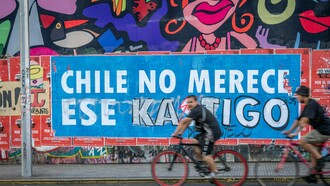We live in a world of polarization and conflict, in a world that is rapidly transforming and focuses on very serious challenges. With the perennial arms race, wars, the increase in inequality, crises in democracy, uncontrolled finance, migration, climate change, and advanced technology, does the world have solutions to get out of all these crises? And the 2023 Global Sustainable Development Report finds that, at this critical moment, incremental and fragmented change is insufficient to achieve the United Nations Agenda 2030 Sustainable Development Goals in the remaining seven years. The allocation of billions of dollars for armaments has become a priority, especially in Western countries. According to new data released by the Stockholm International Peace Research Institute (SIPRI), defense and security outlays across Europe increased by 16% from 2022 to 2023, reaching a total of 552 billion euros.
The global defense budget jumps to a record of $2440 billion after the largest annual rise in government spending on arms in over a decade. The five biggest spenders in 2023 were the United States, China, Russia, India, and Saudi Arabia, which together accounted for 61 percent of world military spending. The United States spends more than any other country; in 2023, it will spend $820 billion. We should be looking at disarmament. In the middle of the cost of living crisis, it is wrong to funnel billions of dollars into keeping weapons of mass destruction while millions of families are living in poverty and dying of hunger. Instead of allocating resources for military expenses, dedicate them to education, healthcare, and research. And with only 10% of military spending, all objectives of the sustainable development of the UN Agenda 2030 would be achieved. The ambitious UN Agenda 2030 at this critical moment in the world it seems has been put aside and that the achievements of the Sustainable Development Goals is slowed down and threatened.
The Agenda was launched by a UN Summit in New York on September 25–27, 2015, and envisages a world of universal respect for human dignity and human rights, the rule of law, justice, equality, and non-discrimination. And was adopted by all United Nations members who posted 17 World Sustainable Development Goals (SDG), created with the aim of peace and prosperity for people and the planet. The heads of state and government and high representatives on behalf of the people have adopted a historic decision on a comprehensive, far-reaching, and people-centered set of universal and transformative goals and targets. The UN 2030 Agenda presents a 'plan of action for people, planet, and prosperity' to be carried out by 2030, aiming to free the human race from the tyranny of poverty. The five pillars of Agenda 2030 are people, planet, prosperity, peace, and partnerships (5Ps). The ambitious 17 Sustainable Goals are:
- No poverty.
- Zero hunger.
- Good health.
- Quality education.
- Gender equality.
- Clean water and sanitation.
- Affordable and clean energy.
- Decent work and economic growth.
- Industry innovation and infrastructure.
- Reduced inequalities.
- Sustainable cities and communities.
- Responsible consumption and production.
- Climate action.
- Life below water.
- Life on land.
- Peace, justice, and strong institutions.
- Partnership for the goals (but missing the prohibition of armaments and cessation of all wars).
The main goal should be to ensure that, by 2030, all people will enjoy peace and prosperity. Sounds great..
Five countries that haven't signed and yet to conduct a voluntary national review (VNR) are Haiti, Myanmar, South Sudan, the United States, and Yemen. President Xi Jinping of China joined other leaders in endorsing the Agenda 2030 for Sustainable Development, providing guidance for the national development of member states and international development in the next 15 years. Russia, along with the other 192 countries, adopted the Agenda in 2015, which focuses on eradicating poverty, ensuring people live healthy lives, reducing inequality, and mitigating climate change.
The United States is committed to reinvigorating action on the Agenda alongside partners around the world. Since 2015 to today, 3943 events have been organized, 1348 publications have been published, and 7850 actions have been undertaken regarding Agenda 2030. The New Universal Agenda demonstrates the ambition to realize the 17 SDGs and 169 targets in areas of critical importance for humanity and the planet. To end poverty, to protect the planet, and to ensure that all human beings can enjoy economic, social, and technological progress. And to foster peaceful, just, and inclusive societies, and to implement the Agenda through a Global Partnership for Sustainable Development. The agenda focuses on economic, social, and environmental integration and on development governance. All countries should engage in a common development path without leaving anyone behind. Leave no one behind.
The index shows an increase in the barriers people face to accessing services, health, career, and educational opportunities. Such inequalities slow economic growth, fuel extreme trends in society, and lead to new conflicts. The global goals of the UN Agenda 2030 seek to end poverty and hunger in all their forms, realize the human rights of all, empower all women and girls, ensure the lasting protection of the planet and its resources, combat inequalities within and among countries, and build peaceful, just, and inclusive societies. UN Agenda 2030 mission goals: marginalization and poverty are two major social issues. Millions of children have poor access to healthcare, education, and safety. And possible solutions to protect children's rights are: to ensure basic healthcare, to encourage education in less developed countries, to improve children's nutrition; and to provide clean water.
About Zero Hunger, according to international agencies, the population of poor countries is living in absolute poverty, faces food insecurity, and suffers from hunger. Although there is enough food for 8 billion people, sadly, there are 828 million on the planet. According to the World Food Program, 40% of these people face severe hunger. And statistics also show that around 9 million people die each year from hunger, most of them children age five or younger. The world should deal with poverty by focusing on interventions that help those suffering food environments should be reinforced, governments should intervene in the food supply chain to reduce the cost of nutritious foods. And in the regions impacted by conflict, humanitarian, development, and peacebuilding initiatives should be rolled out quickly. Tackling at least some of these is possible, but it requires a lot of effort, patience, and understanding.
By 2030, it is less likely that the world will achieve its sustainable development goals. Leaving no one behind is the core principle of the Agenda and represents the commitment of all UN members to eradicate poverty, terminate discrimination, reduce inequalities, and realize human rights for all. The 2030 Agenda represents the first case in human history of a global agreement for creating a future where no one will be left behind. The core of the SDG program for development and poverty reduction relies precisely on the old model of industrial growth. The pursuit of endless industrial growth is chewing through our living planet and threatening our existence. And achieving harmony with nature establishes a commitment to hold global warming below 2 degrees Celsius and calls for sustainable patterns of production and consumption. The energy transition is crucial for creating a new growth and energy model and achieving a low-emission economy. Many countries are in a difficult position in the current global energy crisis due to their reliance on third countries. So the private sector is committed to the green transition.
The world experienced the highest temperatures ever recorded. Extreme heat, wildfires, floods, and storms are impacting lives across the globe, and the world's poorest and most vulnerable people have been the hardest hit. The SDGs offer superficial responses: make resource use more efficient, encourage companies to adopt sustainable practices, reduce food waste, but instead, the only real solution is to reduce overconsumption by the world's wealthy. And the growth doesn't reduce poverty. The poorest 60% of humanity receive only 5% of all new income generated by global growth. And the prospect of growth should allow a more fair distribution of existing resources. A poverty reduction strategy relying on growth will take more than 200 years to eliminate poverty. To reduce the enormous inequality has become the most pressing issue of our time, and the SDG remains silent on it. Inequality marks our global society, where the richest 1% own half of the world's total private wealth.
There are many bilateral trade and investment agreements that liberalise global markets at the expense of the poor. And instead of tackling this crucial issue, Goal 17.10 calls for more liberalisation and more power for the World Trade Organization (WTO). The world didn't eradicate extreme poverty, didn't achieve food security, and didn't implement social protection systems enough. A small progress is made in ensuring primary education completion (due to the statistics), achieving full employment, universal access to electricity, sustainable economic growth, increasing human rights institutions, and increasing internet use. People are not getting excited about the SDGs because they know that business as usual isn't going to deliver the new economy we so desperately need. And most of the goals are far from the target.
Goal 16: promote peaceful and inclusive societies for sustainable development, provide access to justice for all, and build effective, accountable, and inclusive institutions at all levels. Access to justice, means cooperation against cybercrime, countering terrorism, corruption, freedom of expression, internet governance, data protection, ending violence against children, action against trafficking in human organs, and anti-discrimination. The Council of Europe, through its European Commission for the Efficiency of Justice, develops concrete measures and tools aimed at policymakers and judicial practitioners in order to analyse the functioning of judicial systems.
We need a healthy and safe environment today to transform the world in response to a planetary emergency. The more humanity exploits nature in unsustainable ways, the more we undermine our own well-being, security, and prosperity. Countries should strengthen environmental regulations and recognize complex interconnections among the health of people, animals, plants, and our shared environment. Stagnation in the face of multiple crises—migration crises, conflict, and persecution—has forced more than 100 million people around the world to flee their homes. The SDGs cannot be achieved without taking into account the rights and needs of refugees, stateless people, and internally displaced people, ensuring human rights, and providing a power basis for inclusion. UNHCR is working to ensure that refugees have equal rights, food, economic security, inclusion in the healthcare system, and livelihoods. The lack of these rights makes people more vulnerable to exploitation, sexual abuse, and violence, as well as the adoption of negative mechanisms to survive.
To keep international peace, multilateral disarmament and armament restriction are the aims that are most important to the world. The UN's highest priority should be decreasing and ultimately eliminating nuclear weapons, the ban on biological and chemical weapons, all of which pose the greatest dangers to humanity. Goal 17. Partnership for the goals is considered the lost of the perceived priorities, it is indicated by only 3% of the population as one of the most relevant, and only 19% consider all SDGs to be equally important.
Transforming our world' should be a direct call to governments to formulate ambitious responses to facilitate the achievement of the 17 SDGs. And the United Nations system and other international institutions, civil society, business and the private sector, the scientific and academic community, local authorities, indigenous people, and the general public...must work together. The data shows progress in achieving some of the goals over the past few years. However, the world is living in a situation of severe climate and environmental emergencies, economic and social inequalities, and armed conflicts.
Most countries have not adopted and implemented ambitious policy, regulatory, and investment frameworks compatible with achieving major SDG transformation. Half of the SDGs are seriously of track, and the UN member states that signed Agenda 2030 need to move from political intent to action. The world leaders should collectively address the challenges, mobilise resources, and commit to accelerated action towards achieving the SDGs by 2030.
The Global Goals are the world's best plan to build a better world for people and our planet by 2030. Technology, financial resources, creativity, and know-how from all of society are necessary to achieve the SDGs, and every country is needed to reach these ambitious targets.
As UN Secretary Antonio Guterres said, Despite impressive engagement around Sustainable Development Goals, the world is far off track. Much more effort, investment, and systemic change are required. We must take heed and work together to realize the 2030 Agenda and truly transform our world for good.















